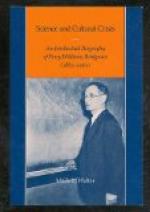|
This section contains 565 words (approx. 2 pages at 300 words per page) |

|
An American physicist and professor of mathematics and natural philosophy at Harvard, Percy William Bridgman was awarded the Nobel Prize for physics in 1946 for his work on the properties of matter under extremely high pressures. He wrote at length on the philosophical implications of the discoveries of modern physics, particularly Albert Einstein's revolutionary special theory of relativity, and on the analysis of scientific concepts. To Bridgman it seemed that Einstein's theory arose chiefly from the application of sound conceptual analysis based on what Bridgman called the "operational point of view." In his opinion, Einstein had not shown "something new about nature"—he was "merely bringing to light implications already contained in the physical operations used in measuring time." Bridgman held that analysis shows that there exists no answer to the question of what we should do, what operations we could perform, in...
|
This section contains 565 words (approx. 2 pages at 300 words per page) |

|


